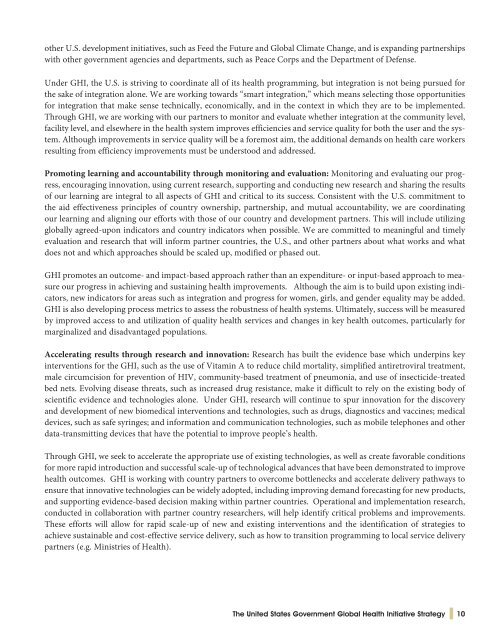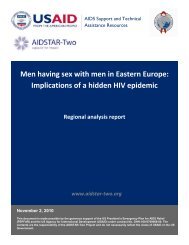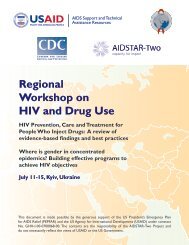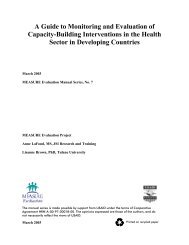The United States Government Global Health Initiative - Centers for ...
The United States Government Global Health Initiative - Centers for ...
The United States Government Global Health Initiative - Centers for ...
Create successful ePaper yourself
Turn your PDF publications into a flip-book with our unique Google optimized e-Paper software.
other U.S. development initiatives, such as Feed the Future and <strong>Global</strong> Climate Change, and is expanding partnerships<br />
with other government agencies and departments, such as Peace Corps and the Department of Defense.<br />
Under GHI, the U.S. is striving to coordinate all of its health programming, but integration is not being pursued <strong>for</strong><br />
the sake of integration alone. We are working towards “smart integration,” which means selecting those opportunities<br />
<strong>for</strong> integration that make sense technically, economically, and in the context in which they are to be implemented.<br />
Through GHI, we are working with our partners to monitor and evaluate whether integration at the community level,<br />
facility level, and elsewhere in the health system improves efficiencies and service quality <strong>for</strong> both the user and the system.<br />
Although improvements in service quality will be a <strong>for</strong>emost aim, the additional demands on health care workers<br />
resulting from efficiency improvements must be understood and addressed.<br />
Promoting learning and accountability through monitoring and evaluation: Monitoring and evaluating our progress,<br />
encouraging innovation, using current research, supporting and conducting new research and sharing the results<br />
of our learning are integral to all aspects of GHI and critical to its success. Consistent with the U.S. commitment to<br />
the aid effectiveness principles of country ownership, partnership, and mutual accountability, we are coordinating<br />
our learning and aligning our ef<strong>for</strong>ts with those of our country and development partners. This will include utilizing<br />
globally agreed-upon indicators and country indicators when possible. We are committed to meaningful and timely<br />
evaluation and research that will in<strong>for</strong>m partner countries, the U.S., and other partners about what works and what<br />
does not and which approaches should be scaled up, modified or phased out.<br />
GHI promotes an outcome- and impact-based approach rather than an expenditure- or input-based approach to measure<br />
our progress in achieving and sustaining health improvements. Although the aim is to build upon existing indicators,<br />
new indicators <strong>for</strong> areas such as integration and progress <strong>for</strong> women, girls, and gender equality may be added.<br />
GHI is also developing process metrics to assess the robustness of health systems. Ultimately, success will be measured<br />
by improved access to and utilization of quality health services and changes in key health outcomes, particularly <strong>for</strong><br />
marginalized and disadvantaged populations.<br />
Accelerating results through research and innovation: Research has built the evidence base which underpins key<br />
interventions <strong>for</strong> the GHI, such as the use of Vitamin A to reduce child mortality, simplified antiretroviral treatment,<br />
male circumcision <strong>for</strong> prevention of HIV, community-based treatment of pneumonia, and use of insecticide-treated<br />
bed nets. Evolving disease threats, such as increased drug resistance, make it difficult to rely on the existing body of<br />
scientific evidence and technologies alone. Under GHI, research will continue to spur innovation <strong>for</strong> the discovery<br />
and development of new biomedical interventions and technologies, such as drugs, diagnostics and vaccines; medical<br />
devices, such as safe syringes; and in<strong>for</strong>mation and communication technologies, such as mobile telephones and other<br />
data-transmitting devices that have the potential to improve people’s health.<br />
Through GHI, we seek to accelerate the appropriate use of existing technologies, as well as create favorable conditions<br />
<strong>for</strong> more rapid introduction and successful scale-up of technological advances that have been demonstrated to improve<br />
health outcomes. GHI is working with country partners to overcome bottlenecks and accelerate delivery pathways to<br />
ensure that innovative technologies can be widely adopted, including improving demand <strong>for</strong>ecasting <strong>for</strong> new products,<br />
and supporting evidence-based decision making within partner countries. Operational and implementation research,<br />
conducted in collaboration with partner country researchers, will help identify critical problems and improvements.<br />
<strong>The</strong>se ef<strong>for</strong>ts will allow <strong>for</strong> rapid scale-up of new and existing interventions and the identification of strategies to<br />
achieve sustainable and cost-effective service delivery, such as how to transition programming to local service delivery<br />
partners (e.g. Ministries of <strong>Health</strong>).<br />
<strong>The</strong> <strong>United</strong> <strong>States</strong> <strong>Government</strong> <strong>Global</strong> <strong>Health</strong> <strong>Initiative</strong> Strategy ▌10









